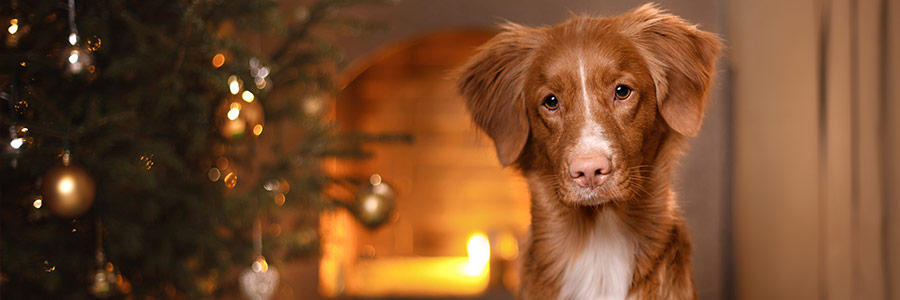
We consider our pets to be part of the family and we want them to enjoy the holiday season safely with us. The holidays bring about lots of excitement and new opportunities to indulge in candy, wrapping paper and holiday décor. With a little attentiveness you can help keep your furry friend safe from the seasonal mischief. Included are some holiday safety ideas to keep in mind for your pet.
- Secure your Christmas tree so it is not tempted to tilt over on to your pet when pulled on or climbed
- The water basin under your live Christmas tree may contain fertilizer or bacteria that could make your pet sick if they were to lap it up
- Tinsel is tempting for pets to play with and they may accidentally tangle themselves or swallow it causing digestive issues
- If you deck the halls with holly, lilies, mistletoe and poinsettias, be cautious, as pets may ingest these items and some could even prove to be fatal
- Edible decorations like popcorn garland strands, salt dough ornaments, and gingerbread houses are fun to create. However, keep in mind they should be kept out of reach or your pet.
- Under the tree is not the appropriate place for gifts that contain food items, coffee, potpourri or other alluring scents
- Keep human food, candy, hot cocoa, drinks and adult beverages out of reach of your fuzzy friend
- Remind guests to keep their luggage, purse or bag securely closed so pets won’t be able to access medications, gum and other hazardous items
- Be cautious and clean up after opening gifts or packaging. Batteries, cellophane, or silica gel packs could look like a chew toy to your pet.
- If you light candles, be sure they are protected on a non-flammable surface and away from the areas your pets frequent. As a reminder, never leave burning candles unattended.
- Prepare a quiet room or a kennel with fresh water where pets can relax away from the noise and crowds
We hope these tips will help your family – furry or not. Enjoy Christmas and the Holiday festivities!
If your pet becomes injured or ill seek emergency help right away. Contact your local veterinarian, pet hospital, or emergency care center for assistance. The ASPCA Animal Poison Control Center (APCC) is an additional resource for animal poison-related emergencies.





